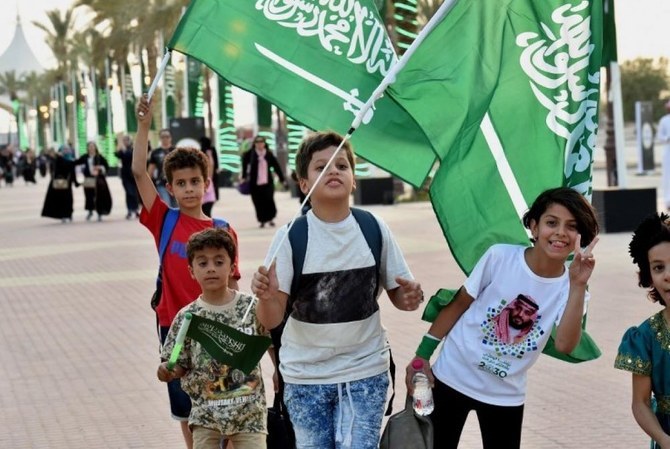Gulf states are happy due to their focus on prosperity and well-being

https://arab.news/pyfy5
One of the critical factors that demonstrates whether or not the policies of a government are heading in the right direction is linked to the quality of life that its population enjoys or lacks.
The UN Sustainable Development Solutions Network recently published a report based on survey data that uses several factors to evaluate people’s rating of their quality of life in more than 150 countries. According to the network, the main analysis related to quality of life and happiness was measured by “life evaluations and emotions, how they have evolved in crisis situations, and how lives have been better where trust, benevolence, and supportive social connections have continued to thrive.”
The Gulf nations rank the highest when it comes to the happiest nations in the Middle East and North Africa region. According to the network’s 2023 World Happiness Report, Saudi Arabia, the UAE and Bahrain emerged as the happiest Arab countries between 2020 and 2022. Meanwhile, countries such as Lebanon and Afghanistan ranked among the unhappiest.
There are several factors that can help explain why countries such as the UAE, Saudi Arabia and Bahrain are listed among the happiest nations in the region. The first reason is related to the status of their economies.
A healthy economy, gross domestic product per capita in terms of purchasing power parity, combined with people’s perception that a brighter future is ahead for the country, play a key role in this regard. For instance, in Lebanon, people feel the pressure as the ongoing cash crisis and economic meltdown continue to grow, with the currency regularly hitting new lows.
Another factor is the rate of inflation. The problem is that skyrocketing inflation drastically affects the ordinary people’s purchasing power, making life extremely difficult for them. Similar to Syria, Lebanon’s inflation rate is much higher than the average in the Arab Gulf states. Saudi Arabia, Kuwait, Bahrain, the UAE, Qatar and Oman are among the countries with the lowest inflation rates in the world. It is worth noting that a healthy standard rate of inflation is about 2 percent to 3 percent per year.
When it comes to Saudi Arabia, the Kingdom’s effective policies and its Vision 2030 are playing an important role in enhancing people’s quality of life and making it one of the happiest nations in the Middle East and North Africa. Vision 2030 is one of the most ambitious and comprehensive plans introduced in the modern Middle East.
This is due to the fact that it encompasses not only economic but also environmental, social and religious landscapes, along with political reforms. As Saudi Crown Prince Mohammed bin Salman pointed out in his 2016 foreword: “We intend to provide better opportunities for partnerships with the private sector through the three pillars: Our position as the heart of the Arab and Islamic worlds, our leading investment capabilities, and our strategic geographical position. We will improve the business environment, so that our economy grows and flourishes, driving healthier employment opportunities for citizens and long-term prosperity for all. This promise is built on cooperation and on mutual responsibility.”
Vision 2030 is one of the most ambitious and comprehensive plans introduced in the modern Middle East.
Dr. Majid Rafizadeh
The Kingdom has taken several steps in its implementation of Vision 2030 that have already proven to be effective and successful. For example, due to the impact of its economic reforms — including enhancing the business environment, attracting foreign investments, privatization, creating private sector jobs, and increasing digitalization — a report by the International Monetary Fund stated last year that Saudi Arabia is likely to be “one of the world’s fastest-growing economies this year.”
The UAE has similarly been placing significant emphasis on people’s well-being. In 2022, the unemployment rate was quite low at 2.75 percent. The Gulf nations have among the lowest unemployment rates in the world. According to Dr. Mugheer Khamis Al-Khaili, chairman of the Department of Community Development, the UAE is “striving to nurture a nation of confident, well-rounded and socially responsible Emiratis, while Abu Dhabi’s Department of Community Development is hard at work engaging and collaborating with all parties to ensure decent standard of living for all citizens, as well as a responsible, proactive and inclusive society founded on cohesive family values.”
Other factors include the level of social support, women’s participation in the workforce, the quality of the healthcare system and a healthy life expectancy. In Saudi Arabia, concerning the healthcare system and women, the accomplishments achieved so far include Saudi Arabia’s healthcare system benefiting “from substantive investment and increased digitization … 90-plus percent of patients received emergency or urgent care within four hours of arrival … Saudi Arabia scored 80/100 in the 2022 World Bank Women, Business and Law Report, up 10 points from 2020 … Saudi female labor participation increased from 19.4 percent to 35.6 percent between 2016 and 2021 … Saudi Arabia has organized over 3,800 entertainment events attended by 80-plus million people … Launched in 2020, the SEHA virtual hospital is the largest in the world, utilizing the latest technologies to support vital health facilities linked to 130 hospitals and provide three specialized services.”
In a nutshell, the Gulf nations, particularly Saudi Arabia, the UAE and Bahrain, are ranked among the happiest nations in the Middle East and North Africa thanks to their healthy and improving economies, strong social support and services, advanced healthcare systems, excellent job opportunities and low levels of unemployment and inflation.
• Dr. Majid Rafizadeh is a Harvard-educated Iranian-American political scientist.
Twitter: @Dr_Rafizadeh









































